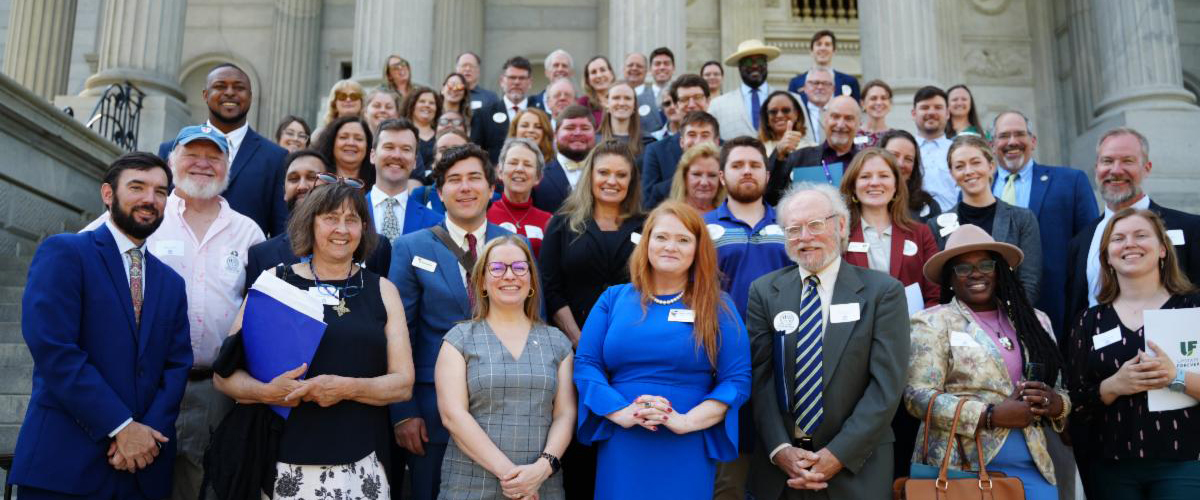Legislative Updates: 2023 Wrap-Up
June 20th, 2023
By Megan Chase-Muller
HIGHLIGHTS:
- What's been happening at the Statehouse since Sine Die?
- Bills that made it to the finish line
- Other priorities advance
The SC General Assembly officially adjourned for the year on May 11th, a day known as “Sine Die” which usually comes with a Sine Die resolution that specifies the bills lawmakers can take up in the off-season, giving them time to finalize the budget, conference committees, and sometimes bills that didn’t make it to the finish line. To our surprise, lawakers did not pass that resolution in the last week of the session, meaning legislators could be called back at any time by the Governor on any subject.
Read below for a look at what has been happening over the past month at the Statehouse and reasons to celebrate as we close out the 2023 legislative session.
news from the statehouse
During the week of May 11th, there was an air of concern at the Statehouse over the lack of a Sine Die resolution, heightened by messages from the Governor’s office ordering them back the following week to take up social and criminal justice issues. By Executive Order No 2023-13, Governor McMaster called for an “extra session” of the SC General Assembly beginning May 16th. Since then, the House and Senate have met several times to take up the Governor’s priorities and other bills, adopt conference committee reports, and ratify acts. Luckily, they wrapped up that work last week and adjourned for the year.
The Budget Conference Committee has been hard at work this month to address deep divides over differences in the House and Senate versions of the state budget, H.4300. After weeks of debate and heated committee meetings, we finally have a budget conference committee report, which was adopted by both Chambers on June 14th. Stay tuned for more news next week as we do a deep dive into the final state budget!
Why do we do this work?
A note on our Legislative Priorities
To safeguard the vitality of the Upstate’s natural landscapes and communities, our priorities go beyond land protection. Each legislative session, we advocate for measures that protect our water resources, increase landscape resilience and public access to the outdoors, facilitate access to clean energy for residents and businesses while keeping bills low, and measures that promote smart, balanced growth. Read below for a rundown of all the progress we made this session in each of these areas, none of which would have been possible without collaboration and support from our partners at the SC Conservation Coalition!

A look back at our Conservation Coalition Lobby Day at the Statehouse in April
Signed by the governor
The Development of Workforce Housing Act (S.284) – authorizes local municipalities and counties to use up to 15% of revenues from local accommodations taxes for the development of affordable workforce housing (defined as housing for rent or sale that falls within 30% - 120% of the area median income). This is a bill Upstate Forever and local organizations like the Greenville Housing Fund have advocated for since its introduction.
The bill in its original form included eligibility for hospitality tax revenues and did not include the 15% cap, however, this bill is still a major win for affordable housing. Another amendment created a Land Development Study Committee to review methods that plan for and manage land development throughout the state. Thanks to everyone who reached out to your legislators, and especially to Senator Ross Turner and Representative Chandra Dillard, both from Greenville, for cosponsoring this bill!
The DHEC Reform Bill (S.399) – The saga of this infamous piece of legislation finally comes to a close after years of debate and intense advocacy from all sides. This bill splits DHEC into two new agencies – the Department of Public Health and the Department of Environmental Control (thankfully) with help from the Department of Administration over the next year.
Of top concern in the environmental community was ensuring citizens retained the ability to challenge harmful permit decisions by DHEC, coupled with an “automatic stay” of the permit activities while under consideration by the DHEC Board and the Administrative Law Court. With the loss of the DHEC Board and other problematic language, there was a serious risk of losing these provisions. After tireless advocacy from the conservation community, we were able to protect the "status quo."
I should note that while this is an important mechanism for citizen input into the permitting process, legal challenges are the last resort for resolving conflict. We hope the newly formed Department of Environmental Services will seriously consider ways to improve the public engagement process in major permitting decisions to resolve potential disputes before the damage is done.
Lastly, we were disappointed to see that this bill will transfer DNR’s Hydrology program, which includes the State Water Planning program, to the new Department of Environmental Services. The hydrologists at DNR are not regulators - they conduct vital research and monitoring necessary to maintain water resources essential for aquatic species' habitat, drinking water, industrial and agricultural use, and recreation. It is unclear how DNR will be able to continue its core function of stewarding our natural resources without the ability to collect data and provide counsel to the state’s decision-makers and regulating agencies.
The drive to move all aspects of water management under one agency, while a simple enough and worthy idea, presents real challenges and costs to our agencies and taxpayers. In reality, the regulated community will still be required to navigate the extensive and often tenuous tangle of regulations at multiple federal and state agencies. However, we have every reason to believe that the current leadership at DNR and DHEC will enable a smooth transition of the Hydrology Program, and we’ll remain involved in the State Water Planning process to continue protecting our water resources for all uses.
Other bills advance
Remember that this is the first year of a two-year session, so any bill that has not made it to the Governor’s desk this year has one more year before it is sent back through the filing and committee process. Take a look at some of the bills that made it through at least one Chamber and will be ready to move quickly next January!
FUNDING SOLUTIONS FOR LAND CONSERVATION AND PUBLIC ACCESS
The Trails Tax Credit Bill (H.3121) championed by Spartanburg Representative Max Hyde, would provide an income tax credit (10 cents per square foot) to property owners who add a trail easement to their land. Alongside our partners at Spartanburg’s Play. Advocate. Live Well. (PAL), we testified and helped gather support for this bill to help our state keep up with the demand for public access to the outdoors.
Status: This bill passed the House and will need a hearing in Senate Finance.
The Working Agricultural Lands Preservation Act (H. 3951) would provide funding to help landowners protect working farms through voluntary conservation easements. Over the past two decades, we have worked with our region’s landowners to protect more than 11,000 acres of working farms, and have witnessed ever-increasing threats to our local food systems and the farms that contribute to our agricultural heritage.
The program created by this bill would leverage state dollars to provide modest financial compensation to qualifying landowners in exchange for a conservation easement that protects working farmland forever. For a farmer looking to protect the agricultural viability and maintain the legacy of their land for future generations, that assistance could mean the difference between a protected property and a property converted to residential or industrial development. While property owners and land trusts already have this option with the Conservation Bank, this bill adds dedicated funding to ensure working lands preservation does not have to compete with applications from other types of green space and heritage sites.
Status: This bill passed the House and the Senate Agriculture Committee, but was then recommitted to Senate Finance after an amendment drastically altered the scope of the bill.
Conservation Enhancement Act (H.3786) would restore a portion of the deed stamp fee (25 cents of every $1.30 collected) to fund the SC Conservation Bank, linking conservation to land development. An amendment was added by Representatives Bruce Bannister and Phillip Lowe that ensures the amount appropriated to the Bank’s Trust Fund through the deed stamp revenues is more closely linked to the state’s general fund, adjusting annual Trust Fund allocations to match the percentage change in projected general fund revenues (either above or below). The conservation community was supportive of this change.
Status: This bill passed the House and is waiting on a Senate Finance Committee hearing.
CLEAN ENERGY SOLUTIONS
The Alternative Fuel Tax Credit (H.3824) would grant income tax credits to municipalities, state agencies, individuals, or businesses that install EV charging stations at fuel distribution or dispensing facilities. As the rate of EV ownership increases throughout the state, this mechanism will provide needed incentives to meet the demand for EV charging.
Status: This bill passed the House and is waiting on a Senate Finance Committee hearing.
The Solar Property Tax Exemption (H.3948) would expand existing property tax exemptions for resident and business-generated solar that was previously capped at 20 kilowatts. Solar farms would not qualify for this exemption. This bill also adds eligibility to battery storage devices and other renewable energy equipment.
Status: This bill passed the House and is waiting on a Senate Finance Committee hearing.
The Energy Efficiency Bill (H.4282) would launch a suite of programs to build the energy efficiency economy in South Carolina. As we hasten the transition to cleaner energy sources and electric transportation, we need to ensure the systems that deliver that energy to and within our homes and businesses are as efficient as possible. South Carolina ranks as one of the least energy-efficient states in the country (49 out of 50), so it is imperative we prioritize solutions such as those presented in H.4282 to bring relief to residents and businesses.
Status: Waiting for a hearing in the House Labor, Commerce, and Industry Committee.
As we look ahead to the next legislative session, be on the lookout for more opportunities to engage with your legislators and please be in touch with any questions or ideas to consider for next year!

Megan Chase-Muller
State Policy Director
mchase@upstateforever.org
ODDS AND ENDS AND ACTIONS:
Did you receive this Update as a forward and want to sign up for it yourself? You can do so right here. The Legislative Update will hit your mailbox every week during session.
Did your senator or representative do something awesome this year? Tell them! Use this link to find out who represents you, and if you loved a bill they've supported, please let them know. You can also just use the link to tell them what is important to you.

